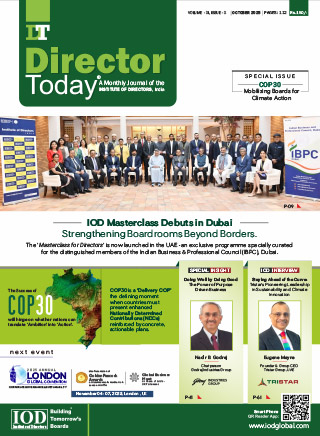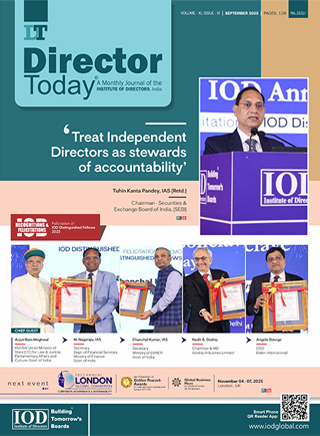Corporate Governance in Luxembourg

Diversity in Governance: Luxembourg's Unique Corporate Governance Landscape
Insights from the Luxembourg Institute of Governance (ILA)
Luxembourg, a founding member of the European Union, is unique in terms of its social composition and economic structure. There is no other country in the world where almost half of its citizens have a foreign nationality. This fact, which originated in the second half of the 19th century, can be explained by the economic development of the Grand Duchy. The successful development of the steel industry in the 20th century and then Luxembourg's success in the crossborder asset management, banking and insurance activities, which has made Luxembourg one of the world's leading financial centres, has led to a culturally diverse society. This cultural diversity is also reflected in the boardrooms in Luxembourg as well as in the membership of the Luxembourg Institute of Governance (ILA - Institut Luxembourgeois des Administrateurs). This has also led to the Grand Duchy being characterised in particular by its openness and international orientation. This circumstance has had and continues to have a positive impact on the development of corporate governance in Luxembourg. Due to the financial centre's numerous regulated entities and their products and services, Luxembourg has extensive experience in implementing and applying the highest European and international corporate governance standards. Unregulated entities, such as start-ups, scale-ups, SMEs, familyowned businesses, as well as non-profit organisations and foundations, benefit through the transfer of this knowledge, the experiences and best practices developed over the years.
More attention is being paid to harmonising and optimizing the entire governance system in organisations, which are less and less operating on a vertical, top-down decision making process, but on a vertical approach that also incorporates the needs, values and behaviours of all stakeholders.
In Luxembourg, this transfer of knowledge is organised amongst others by the Luxembourg Institute of Governance (ILA), having as main mission to elevate governance standards by educating, connecting and inspiring. ILA achieves this through regularly updated training and certification programmes, conferences and networking events for executive and non-executive directors as well as corporate governance professionals.
Equally important as providing the governance community in Luxembourg with the currently relevant knowledge is understanding what challenges and opportunities lie ahead in the near and distant future and how to prepare for them. ILA seeks to address this by developing thought leadership positions, which are driven by our working groups, by engaging with our members but also with private and public stakeholders, and by developing and maintaining international governance networks.
Key priorities in Luxembourg include topics such as board composition & diversity, board and directors effectiveness, as well as the systematic evaluation of the boardroom.
The latter plays an important role in in our endeavour. ILA does not only maintain relations with our European sister organisations, which are represented under the umbrella of the European Confederation of Directors' Associations (Ecoda), but also with many other governance institutes around the world. In a globalised world with so many shared challenges, exchanging best practices and experiences with other institutions is invaluable.
Global developments that bring about far-reaching changes are numerous and consequently at the top of the boardroom agenda. The main drivers include technological progress, changing societal and market expectations, political and regulatory pressure and urgent challenges such as climate change and environmental degradation. The rapidly growing impact of AI, the multiple risks associated with cybersecurity, the antagonistic relationships between boards and shareholders that have been observed more often than in the past, as well as the growing shareholder activism and ESG-related requirements are just a few of the trends in Luxembourg and elsewhere that require common responses.
Indeed, all these factors increase complexity and have inevitably an impact on organisations and their boards. Therefore, there is an urgent need and opportunity today to re-evaluate the role, structure, membership and functioning of the board. Consequently, key priorities in Luxembourg include topics such as board composition & diversity, board and directors’ effectiveness, as well as the systematic evaluation of the boardroom. As the demands placed on directors are constantly increasing and becoming more diverse, a great deal revolves ofcourse around developing their individual skills and competencies with up-do-date training. However, the right composition and efficiency of the board as a collective body will likely continue to increase in importance.
Furthermore, to meet all current and future challenges, more and more attention is being paid to harmonising and optimizing the entire governance system in organisations, which are less and less operating on a vertical, top-down decision-making process, but on a vertical approach that also incorporates the needs, values and behaviours of all stakeholders. Therefore, not only will great importance continue to be attached to structures, procedures and processes that can improve the effectiveness and efficiency of the board, but also to the further development of the structures that support the board, such as the corporate secretariat. In this regard, we see particular potential and a priority in the further development of the role of the corporate governance officer.
An improved corporate governance system also includes the increased use of digital solutions to support the board of directors and the support functions. It is expected that the market for such solutions will continue to develop strongly in the coming years. This development will also make it easier to create benchmarks that make it easier to measure and improve.
In the face of all these developments, the exchange of experiences between directors and corporate governance professionals in the country, but also outside it, remains key. Therefore, we at the ILA will do everything we can to continue to support and promote this exchange by constantly expanding our national and international network.
Author
Mr. Philipp von Restorff
Chief Executive Officer - The Luxembourg Institute of Governance (ILA)
Owned by: Institute of Directors, India
Disclaimer: The opinions expressed in the articles/ stories are the personal opinions of the author. IOD/ Editor is not responsible for the accuracy, completeness, suitability, or validity of any information in those articles. The information, facts or opinions expressed in the articles/ speeches do not reflect the views of IOD/ Editor and IOD/ Editor does not assume any responsibility or liability for the same.

 Quick Links
Quick Links
 Connect us
Connect us




 Back to Home
Back to Home































